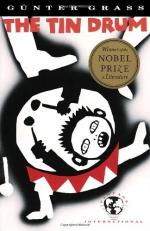|
|
The Tin Drum Chapter 9: The Rostrum
That Christmas Agnes bought four tickets to the theater - for herself, for Oskar, and for Stephan and Marga Bronski. Oskar laments the fact that there were too many children there for his taste - Marga spent her time playing at the balcony rail. Oskar identified with the play - it was Tom Thumb. It was marked by the fact that the audience never saw Tom Thumb; he was instead played by an invisible offstage voice. The play made Agnes cry; she called Oskar Tom Thumb until after Christmas.
They did not go to the theater again until the summer of 1933, when Agnes, Oskar, Alfred Matzerath, and Jan Bronski took a trip to the Opera-in-the-Woods. A morning in the park, then an afternoon at the beach - Agnes, who was already beginning to get fat, wore a straw-colored bathing suit. Oskar was supposed to go naked; he covered his private parts with his drum. Later they had coffee and cake; Ages ate three helpings of five-story cake.
Jan was friends with the brothers who did the lighting for Opera-in-the-Woods, who told jokes and introduced them to one of the Opera's shareholders. This man offered Jan and his entourage his tickets for that evening's performance of The Flying Dutchman. Oskar fell asleep during the opera, but he awoke to the sound of a blond woman singing loudly on the stage, which Oskar interpreted as screaming in pain because there was a spotlight on her. He thought her screaming was a pleading to one of Jan's friends to turn the light off. When he did not oblige, Oskar let out a scream of his own and destroyed the light, plunging the theater into darkness, starting a fire, and creating a panic in which he lost his drum.
Because of this episode, Agnes decided to take Oskar to the circus. It was there that he first met the musical clown Bebra, a man who was to become Oskar's lifelong influence and role model. He, like Oskar, had refused to grow into an adult. As soon as he sees Oskar, he is impressed that he decided to remain a three-year-old. Bebra announced that he is directly descended from Prince Eugene, whose father was Louis XIV. He said that he had decided to stop growing on his tenth birthday: "Better late than never," he said. He announced he was fifty-three years old; Oskar said he was nine-and-a-half. Oskar, being impressed with Bebra's act, decided to show him his glass-breaking voice. Bebra offered to hire Oskar right then; Oskar says:
"Even today I am occasionally sorry that I declined. I talked myself out of it, saying: 'You know, Mr. Bebra, I prefer to regard myself as a member of the audience. I cultivate my little art in secret, far from all applause. But it gives me pleasure to applaud your accomplishments.' Mr. Bebra raised a wrinkled forefinger and admonished me: 'My dear Oskar, believe an experienced colleague. Our kind has no place in the audience. We must perform, we must run the show. If we don't, it's the others that run us. And they don't do it with kid gloves.'" Chapter 9, pg. 114
Bebra warns Oskar that "they" are coming; that "they" will fill rostrums, and that Oskar should always take care to be on top of and not in front of the rostrum. Bebra kisses Oskar on the forehead as he leaves, angering Agnes.
Agnes followed Sigismund Markus' advice - she stopped seeing Jan except at family skat games and stayed with Alfred, who joined with the Nazi party in 1934. The portrait of Beethoven over the piano, a present from Greff, was replaced with a portrait of Hitler. Though Alfred wanted to banish the Beethoven portrait, Agnes made him keep it up, hanging it over the sideboard. Oskar says the two portraits, Hitler and the genius, sat unhappily staring eye to eye. Alfred pieced together his Nazi uniform slowly, piece by piece, and started attending Sunday rallies religiously. Jan Bronski caught on and began to visit Agnes on Sundays while Alfred was out. Not wanting to disturb them, Oskar would slip out and head toward the rallies.
Oskar admired one of the party's members - a hunchbacked man named Löbsack, the Nazi's district chief of training. He thought Löbsack to be a man fighting on behalf of those like Bebra and himself, as he derived his intelligence and wit from his hump, but realizes he is wrong. The party heads spoke from a rostrum - a platform on which was set up symmetrical rows of flags and people for a rally. Per Bebra's orders, Oskar spent his time at the rallies on the rostrum.
One Sunday Oskar took another tack - he approached the rostrum from its "uncouth" and went underneath. Oskar began to beat out a waltz on his drum over the rectilinear march played by the band. Couples in the audience started dancing. Oskar switched to the Charleston, and after a moment of chaos, the crowd understood and everyone began to dance. For an hour, the SS and SA men tore holes in the rostrum looking for a culprit, but they never found Oskar, who slipped out as an unnoticed three-year-old.




